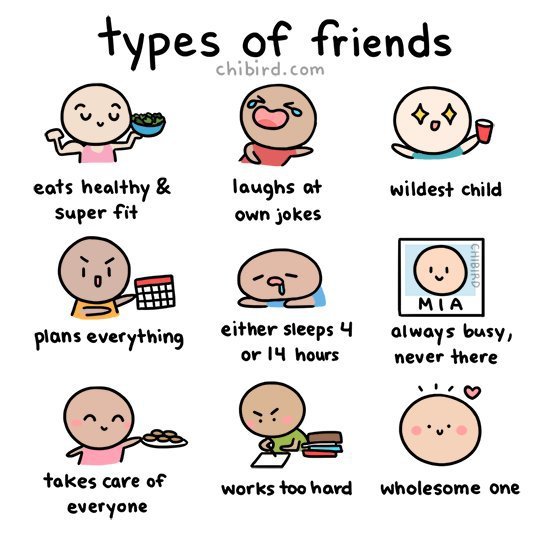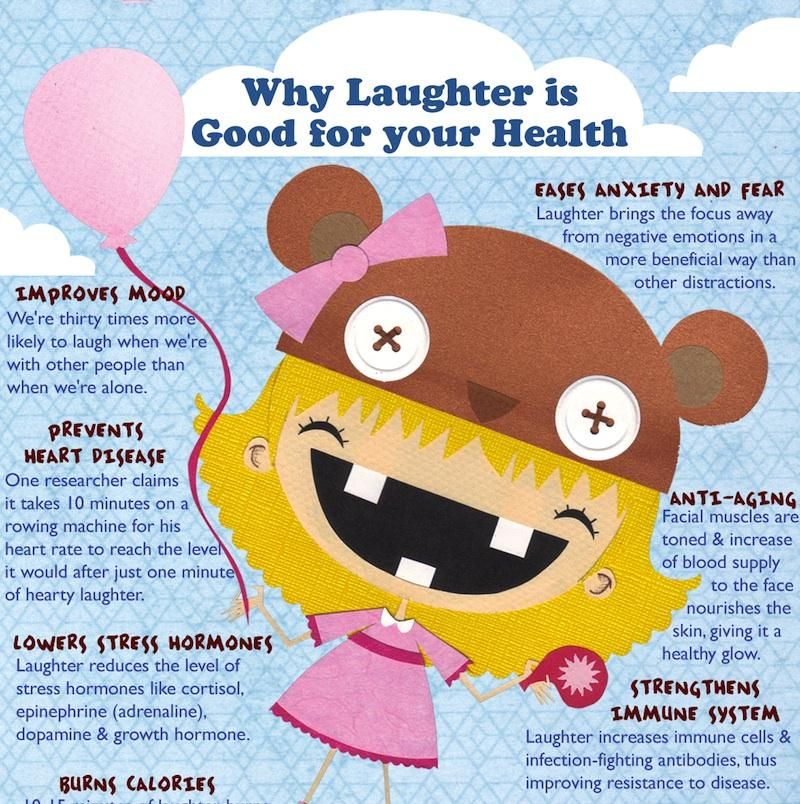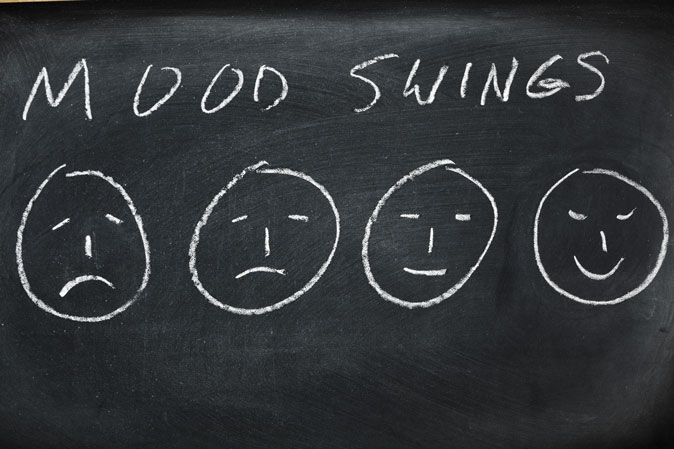Why laughing is healthy
Laughter is the Best Medicine
well-being & happiness
It’s fun to share a good laugh, but did you know it can actually improve your health? Learn how to harness the powerful benefits of laughter and humor.
The benefits of laughter
It’s true: laughter is strong medicine. It draws people together in ways that trigger healthy physical and emotional changes in the body. Laughter strengthens your immune system, boosts mood, diminishes pain, and protects you from the damaging effects of stress. Nothing works faster or more dependably to bring your mind and body back into balance than a good laugh. Humor lightens your burdens, inspires hope, connects you to others, and keeps you grounded, focused, and alert. It also helps you release anger and forgive sooner.
With so much power to heal and renew, the ability to laugh easily and frequently is a tremendous resource for surmounting problems, enhancing your relationships, and supporting both physical and emotional health. Best of all, this priceless medicine is fun, free, and easy to use.
As children, we used to laugh hundreds of times a day, but as adults, life tends to be more serious and laughter more infrequent. But by seeking out more opportunities for humor and laughter, you can improve your emotional health, strengthen your relationships, find greater happiness—and even add years to your life.
Laughter is good for your health
Laughter relaxes the whole body. A good, hearty laugh relieves physical tension and stress, leaving your muscles relaxed for up to 45 minutes after.
Laughter boosts the immune system. Laughter decreases stress hormones and increases immune cells and infection-fighting antibodies, thus improving your resistance to disease.
Laughter triggers the release of endorphins, the body's natural feel-good chemicals. Endorphins promote an overall sense of well-being and can even temporarily relieve pain.
Laughter protects the heart. Laughter improves the function of blood vessels and increases blood flow, which can help protect you against a heart attack and other cardiovascular problems.
Laughter improves the function of blood vessels and increases blood flow, which can help protect you against a heart attack and other cardiovascular problems.
Laughter burns calories. Okay, so it's no replacement for going to the gym, but one study found that laughing for 10 to 15 minutes a day can burn approximately 40 calories—which could be enough to lose three or four pounds over the course of a year.
Laughter lightens anger's heavy load. Nothing diffuses anger and conflict faster than a shared laugh. Looking at the funny side can put problems into perspective and enable you to move on from confrontations without holding onto bitterness or resentment.
Laughter may even help you to live longer. A study in Norway found that people with a strong sense of humor outlived those who don't laugh as much. The difference was particularly notable for those battling cancer.
What are the physical, mental, and social benefits of laughter?
Physical health benefits
- Boosts immunity
- Lowers stress hormones
- Decreases pain
- Relaxes your muscles
- Prevents heart disease
Mental health benefits
- Adds joy and zest to life
- Eases anxiety and tension
- Relieves stress
- Improves mood
- Strengthens resilience
Social benefits
- Strengthens relationships
- Attracts others to us
- Enhances teamwork
- Helps defuse conflict
- Promotes group bonding
Laughter helps you stay mentally healthy
Laughter makes you feel good. And this positive feeling remains with you even after the laughter subsides. Humor helps you keep a positive, optimistic outlook through difficult situations, disappointments, and loss.
And this positive feeling remains with you even after the laughter subsides. Humor helps you keep a positive, optimistic outlook through difficult situations, disappointments, and loss.
[Read: Cultivating Happiness]
More than just a respite from sadness and pain, laughter gives you the courage and strength to find new sources of meaning and hope. Even in the most difficult of times, a laugh–or even simply a smile–can go a long way toward making you feel better. And laughter really is contagious—just hearing laughter primes your brain and readies you to smile and join in the fun.
The link between laughter and mental health
Laughter stops distressing emotions. You can't feel anxious, angry, or sad when you're laughing.
Laughter helps you relax and recharge. It reduces stress and increases energy, enabling you to stay focused and accomplish more.
Laughter shifts perspective, allowing you to see situations in a more realistic, less threatening light. A humorous perspective creates psychological distance, which can help you avoid feeling overwhelmed and diffuse conflict.
A humorous perspective creates psychological distance, which can help you avoid feeling overwhelmed and diffuse conflict.
Laughter draws you closer to others, which can have a profound effect on all aspects of your mental and emotional health.
With over 25,000 licensed counselors, BetterHelp has a therapist that fits your needs. Sign up today and get matched.
GET 20% OFF
Affordable private online therapy. Get instant help, on any device, wherever you are in the world. Start feeling better today!
GET 20% OFF
Get professional online counseling for relationship or marital issues. It’s confidential and convenient to get started.
GET 20% OFF
Laughter brings people together and strengthens relationships
There's a good reason why TV sitcoms use laugh tracks: laughter is contagious. You're many times more likely to laugh around other people than when you're alone. And the more laughter you bring into your own life, the happier you and those around you will feel.
Sharing humor is half the fun—in fact, most laughter doesn't come from hearing jokes, but rather simply from spending time with friends and family. And it's this social aspect that plays such an important role in the health benefits of laughter. You can't enjoy a laugh with other people unless you take the time to really engage with them. When you care about someone enough to switch off your phone and really connect face to face, you're engaging in a process that rebalances the nervous system and puts the brakes on defensive stress responses like “fight or flight.” And if you share a laugh as well, you'll both feel happier, more positive, and more relaxed—even if you're unable to alter a stressful situation.
How laughing together can strengthen relationships
Shared laughter is one of the most effective tools for keeping relationships fresh and exciting. All emotional sharing builds strong and lasting relationship bonds, but sharing laughter also adds joy, vitality, and resilience. And humor is a powerful and effective way to heal resentments, disagreements, and hurts. Laughter unites people during difficult times.
And humor is a powerful and effective way to heal resentments, disagreements, and hurts. Laughter unites people during difficult times.
Humor and playful communication strengthen our relationships by triggering positive feelings and fostering emotional connection. When we laugh with one another, a positive bond is created. This bond acts as a strong buffer against stress, disagreements, and disappointment. Humor and laughter in relationships allows you to:
Be more spontaneous. Humor gets you out of your head and away from your troubles.
Let go of defensiveness. Laughter helps you forget resentments, judgments, criticisms, and doubts.
Release inhibitions. Your fear of holding back is pushed aside.
Express your true feelings. Deeply felt emotions are allowed to rise to the surface.
Use humor to resolve disagreements and tension in your relationship
Laughter is an especially powerful tool for managing conflict and reducing tension when emotions are running high. Whether with romantic partners, friends and family, or co-workers, you can learn to use humor to smooth over disagreements, lower everyone's stress level, and communicate in a way that builds up your relationships rather than breaking them down.
Whether with romantic partners, friends and family, or co-workers, you can learn to use humor to smooth over disagreements, lower everyone's stress level, and communicate in a way that builds up your relationships rather than breaking them down.
How to bring more laughter into your life
Laughter is your birthright, a natural part of life that is innate and inborn. Infants begin smiling during the first weeks of life and laugh out loud within months of being born. Even if you did not grow up in a household where laughter was a common sound, you can learn to laugh at any stage of life.
Begin by setting aside special times to seek out humor and laughter, as you might with exercising, and build from there. Eventually, you'll want to incorporate humor and laughter into the fabric of your life, finding it naturally in everything.
Here are some ways to start:
Smile. Smiling is the beginning of laughter, and like laughter, it's contagious. When you look at someone or see something even mildly pleasing, practice smiling. Instead of looking down at your phone, look up and smile at people you pass in the street, the person serving you a morning coffee, or the co-workers you share an elevator with. Notice the effect on others.
Instead of looking down at your phone, look up and smile at people you pass in the street, the person serving you a morning coffee, or the co-workers you share an elevator with. Notice the effect on others.
Count your blessings. Literally make a list. The simple act of considering the positive aspects of your life will distance you from negative thoughts that block humor and laughter. When you're in a state of sadness, you have further to travel to reach humor and laughter.
[Listen: Gratitude in Difficult Times]
When you hear laughter, move toward it. Sometimes humor and laughter are private, a shared joke among a small group, but usually not. More often, people are very happy to share something funny because it gives them an opportunity to laugh again and feed off the humor you find in it. When you hear laughter, seek it out and ask, “What's funny?”
Spend time with fun, playful people. These are people who laugh easily–both at themselves and at life's absurdities–and who routinely find the humor in everyday events. Their playful point of view and laughter are contagious. Even if you don't consider yourself a lighthearted, humorous person, you can still seek out people who like to laugh and make others laugh. Every comedian appreciates an audience.
Their playful point of view and laughter are contagious. Even if you don't consider yourself a lighthearted, humorous person, you can still seek out people who like to laugh and make others laugh. Every comedian appreciates an audience.
Bring humor into conversations. Ask people, “What's the funniest thing that happened to you today? This week? In your life?”
Advertisement
40 Days to Positive Change
Learn how to fully embrace the change process and create a positive new habit in your life. Join Kelly McGonigal for a free video from Sounds True and initiate the transformation you need most.
WATCH THE FREE VIDEO
Simulated laughter
So, what if you really can't “find the funny?” Believe it or not, it's possible to laugh without experiencing a funny event—and simulated laughter can be just as beneficial as the real thing. It can even make exercise more fun and productive. A Georgia State University study found that incorporating bouts of simulated laughter into an exercise program helped improve older adults' mental health as well as their aerobic endurance. Plus, hearing others laugh, even for no apparent reason, can often trigger genuine laughter.
Plus, hearing others laugh, even for no apparent reason, can often trigger genuine laughter.
To add simulated laughter into your own life, search for laugh yoga or laugh therapy groups. Or you can start simply by laughing at other people's jokes, even if you don't find them funny. Both you and the other person will feel good, it will draw you closer together, and who knows, it may even lead to some spontaneous laughter.
Creating opportunities to laugh
- Watch a funny movie, TV show, or YouTube video.
- Invite friends or co-workers out to a comedy club.
- Read the funny pages.
- Seek out funny people.
- Share a good joke or a funny story.
- Check out your bookstore's humor section.
- Host game night with friends.
- Play with a pet.
- Go to a “laughter yoga” class.
- Goof around with children.
- Do something silly.
- Make time for fun activities (e.g. bowling, miniature golfing, karaoke).
ADVERTISEMENT
Tips for developing your sense of humor
An essential ingredient for developing your sense of humor is to learn not to take yourself too seriously and laugh at your own mistakes and foibles. As much as we'd like to believe otherwise, we all do foolish things from time to time. Instead of feeling embarrassed or defensive, embrace your imperfections. While some events in life are clearly sad and not opportunities for laughter, most don't carry an overwhelming sense of either sadness or delight. They fall into the gray zone of ordinary life—giving you the choice to laugh or not. So, choose to laugh whenever you can.
As much as we'd like to believe otherwise, we all do foolish things from time to time. Instead of feeling embarrassed or defensive, embrace your imperfections. While some events in life are clearly sad and not opportunities for laughter, most don't carry an overwhelming sense of either sadness or delight. They fall into the gray zone of ordinary life—giving you the choice to laugh or not. So, choose to laugh whenever you can.
How to develop your sense of humor
Laugh at yourself. Share your embarrassing moments. The best way to take yourself less seriously is to talk about times when you took yourself too seriously.
Attempt to laugh at situations rather than bemoan them. Look for the humor in a bad situation, and uncover the irony and absurdity of life. When something negative happens, try to make it a humorous anecdote that will make others laugh.
Surround yourself with reminders to lighten up. Keep a toy on your desk or in your car. Put up a funny poster in your office. Choose a computer screensaver that makes you laugh. Frame photos of you and your family or friends having fun.
Put up a funny poster in your office. Choose a computer screensaver that makes you laugh. Frame photos of you and your family or friends having fun.
Remember funny things that happen. If something amusing happens or you hear a joke or funny story you really like, write it down or tell it to someone to help you remember it.
Don't dwell on the negative. Try to avoid negative people and don't dwell on news stories, entertainment, or conversations that make you sad or unhappy. Many things in life are beyond your control—particularly the behavior of other people. While you might view carrying the weight of the world on your shoulders as admirable, in the long run it's unrealistic and unhealthy.
Find your inner child. Pay attention to children and try to emulate them—after all, they are the experts on playing, taking life lightly, and laughing at ordinary things.
Deal with stress. Stress can be a major impediment to humor and laughter, so it's important to keep your stress levels in check. One great technique to relieve stress in the moment is to draw upon a favorite memory that always makes you smile—something your kids did, for example, or something funny a friend told you.
One great technique to relieve stress in the moment is to draw upon a favorite memory that always makes you smile—something your kids did, for example, or something funny a friend told you.
Don't go a day without laughing. Think of it like exercise or breakfast and make a conscious effort to find something each day that makes you laugh. Set aside 10 to 15 minutes and do something that amuses you. The more you get used to laughing each day, the less effort you'll have to make.
Using humor to overcome challenges and enhance your life
The ability to laugh, play, and have fun not only makes life more enjoyable but also helps you solve problems, connect with others, and think more creatively. People who incorporate humor and play into their daily lives find that it renews them and all of their relationships.
Life brings challenges that can either get the best of you or become playthings for your imagination. When you “become the problem” and take yourself too seriously, it can be hard to think outside the box and find new solutions. But when you play with the problem, you can often transform it into an opportunity for creative learning.
But when you play with the problem, you can often transform it into an opportunity for creative learning.
[Read: Managing Conflict with Humor]
Playing with problems seems to come naturally to children. When they are confused or afraid, they make their problems into a game, giving them a sense of control and an opportunity to experiment with new solutions. Interacting with others in playful ways helps you retain this creative ability.
Here are two examples of people who took everyday problems and turned them around through laughter and play:
- Roy, a semi-retired businessman, was excited to finally have time to devote to golf, his favorite sport. But the more he played, the less he enjoyed himself. Although his game had improved dramatically, he got angry with himself over every mistake. Roy wisely realized that his golfing buddies affected his attitude, so he stopped playing with people who took the game too seriously. When he played with friends who focused more on having fun than on their scores, he was less critical of himself.
 Now golfing was as enjoyable as Roy had envisioned. He scored better without working harder. And the brighter outlook he was gaining from his companions and the game spread to other parts of his life.
Now golfing was as enjoyable as Roy had envisioned. He scored better without working harder. And the brighter outlook he was gaining from his companions and the game spread to other parts of his life. - Jane worked at home designing greeting cards, a job she used to love but now felt had become routine. Two little girls who loved to draw and paint lived next door. Eventually, Jane invited the girls over to play with all of her art supplies. At first, she just watched, but in time she joined in. Laughing, coloring, and playing pretend with the little girls transformed Jane's life. Not only did it end her loneliness and boredom, but it sparked her imagination and helped her artwork flourish. Best of all, it rekindled the playfulness in Jane's relationship with her husband.
As laughter, humor, and play become integrated into your life, your creativity will flourish and new opportunities for laughing with friends, coworkers, acquaintances, and loved ones will occur to you daily. Laughter takes you to a higher place where you can view the world from a more relaxed, positive, and joyful perspective.
Laughter takes you to a higher place where you can view the world from a more relaxed, positive, and joyful perspective.
Authors: Lawrence Robinson, Melinda Smith, M.A., and Jeanne Segal, Ph.D.
- References
Buchowski, M. S., Majchrzak, K. M., Blomquist, K., Chen, K. Y., Byrne, D. W., & Bachorowski, J.-A. (2007). Energy expenditure of genuine laughter. International Journal of Obesity, 31(1), 131–137. https://doi.org/10.1038/sj.ijo.0803353
Laugh and be thankful—It’s good for the heart—Harvard Health. (n.d.). Retrieved May 25, 2022, from https://www.health.harvard.edu/blog/laugh-and-be-thankful-its-good-for-the-heart-20101124839
Manninen, S., Tuominen, L., Dunbar, R. I., Karjalainen, T., Hirvonen, J., Arponen, E., Hari, R., Jääskeläinen, I. P., Sams, M., & Nummenmaa, L. (2017). Social Laughter Triggers Endogenous Opioid Release in Humans. The Journal of Neuroscience, 37(25), 6125–6131.
 https://doi.org/10.1523/JNEUROSCI.0688-16.2017
https://doi.org/10.1523/JNEUROSCI.0688-16.2017Miller, M., & Fry, W. F. (2009). The effect of mirthful laughter on the human cardiovascular system. Medical Hypotheses, 73(5), 636–639. https://doi.org/10.1016/j.mehy.2009.02.044/p>
Romundstad, S., Svebak, S., Holen, A., & Holmen, J. (2016). A 15-Year Follow-Up Study of Sense of Humor and Causes of Mortality: The Nord-Trøndelag Health Study. Psychosomatic Medicine, 78(3), 345–353. https://doi.org/10.1097/PSY.0000000000000275
Speer, M. E., & Delgado, M. R. (2017). Reminiscing about positive memories buffers acute stress responses. Nature Human Behaviour, 1(5), 0093. https://doi.org/10.1038/s41562-017-0093
Yim, J. (2016). Therapeutic Benefits of Laughter in Mental Health: A Theoretical Review. The Tohoku Journal of Experimental Medicine, 239(3), 243–249. https://doi.org/10.1620/tjem.239.243
Last updated: November 15, 2022
7 Surprising Benefits of Laughing
Blog Home / Healthy Living
Studies show a good dose of laughter has great benefits for your body.

by Amberlee Lovell Peterson
Laughter may not be the best medicine, but it’s still a pretty good one. Scientists have spent years studying laughter, and studies still show a good dose of laughter has great benefits for your body.
Related: Why Smiling Is Good for You
Here are seven health benefits of laughter:
Relieves pain
True laughter releases endorphins. One effect of the release of this hormone is that it increases pain tolerance. One study had participants watch 15 minutes of a comedy show in a group. Their pain tolerance increased 10% more than before the laughter. For those who watched a comedy show alone rather than with others, their pain tolerance also increased, but it was slightly less than 10%.
Increases your chances of getting pregnant
A 2011 study showed women going through in vitro fertilization were 16% more likely to get pregnant when entertained by a clown than those who did not have the clown encounter.
Helps your heart
A good guffaw is healthy for your heart. It helps your heart by increasing the amount of oxygen in your blood and kicking up your heart rate. It also decreases arterial wall stiffness–a link to cardiovascular disease.
Boosts your immune system
Laughing can help you stay safe from viruses by improving your immune system. Laughing releases more anti-infection antibodies to help protect your body from infection.
Makes you happier
Laughing helps lighten your mood. It can lessen chronic depression and anxiety as well as make it easier to cope with challenging situations.
Related: The Power of Being Grateful
Reduces stress
Your body releases cortisol when you’re stressed. Because it’s known as the stress hormone, cortisol gets a bad rap, but it plays an important role in the body. It helps manage blood sugar levels, reduces inflammation, manages metabolism, and triggers the fight or flight response in your body at critical times. But too much cortisol and your body feels that stress.
But too much cortisol and your body feels that stress.
Laughter is one of the ways your body can help regulate cortisol. Laughing increases your oxygen intake, which stimulates body circulation and decreases your cortisol levels. Some studies show that just the act of laughing—without having humor in it—can have positive stress-relieving effects.
Relaxes your body
Stress causes your muscles to tense up. Laughing can help relieve stress because it relaxes your muscles. A good laugh can relieve your muscles of extra stress for up to 45 minutes because it stimulates circulation.
Taking a self-care break and finding things that entertain you can feel like a luxury, but for the sake of your health, it’s essential. Even 15 minutes a day to do something that makes you laugh could help you live into retirement. Or, if nothing strikes you as funny, just force a fake laugh and see what happens.
ABOUT THE AUTHOR
Amberlee is a content manager, freelance writer, and designer. She is currently working on launching her own podcast and loves baby foxes.
She is currently working on launching her own podcast and loves baby foxes.
Related Articles
Why You Should Set Healthy Boundaries
Understanding the importance of healthy boundaries can benefit you in your personal and professional life.
All You Need to Know About Gastroesophageal Reflux Disease (GERD)
If you’re experiencing heartburn often, it might be more serious than you think.
Surprising but Important Facts About Breast Cancer
Even though it’s one of the most common types of cancer, you may not know these facts about breast cancer.
Interesting Home Safety Facts to Protect Your Family
We’ve compiled some interesting home safety facts, along with tips to keep your family happy and healthy.
ABOUT THE AUTHOR
Amberlee is a content manager, freelance writer, and designer. She is currently working on launching her own podcast and loves baby foxes.
Why is it useful to laugh? | Psychology
I probably won't discover America if I say that laughter is the first weapon against stress. It prolongs and beautifies the life of a person. Still don't believe? I will try to prove it to you.
Just the facts
The first baby smile appears at 3-4 months. The funniest age is 6-7 years. Children laugh about 250 times a day. For comparison, an adult can smile a maximum of 12 times a day. (I'm not very sure if this applies to Russians).
Laughing well is a whole science. But if you master it, then almost anyone can laugh beautifully.
There is also a special science - helotology , which studies the effects of laughter on the mental and physical health of people. Gelotologists are looking for the causes of laughter. Now no one doubts the fact that the treatment with laughter is very effective and has practically no side effects.
Gelotologists are looking for the causes of laughter. Now no one doubts the fact that the treatment with laughter is very effective and has practically no side effects.
The founder of gelotology is the American psychologist Norman Cousins. He is also known as "the man who made death laugh." The beginning of this story is very sad. Cousins fell ill: he developed collagenosis, a serious disease of connective tissues and bones. The doctors were powerless, and the patient lost the ability to move at the end of the treatment. He asked to be discharged home, and puzzled the household with a request to start showing comedies for him. He watched one after the other for several days in a row, laughing "till you drop." He noticed that the terrible pain that tormented him subsided. After a couple of weeks, the doctors found that the condition of a hopeless patient began to improve by leaps and bounds. Laughter therapy helped Norman return to work after 3 years. In addition, he could play his favorite pieces on the piano in his free time.
Laughter therapy helped Norman return to work after 3 years. In addition, he could play his favorite pieces on the piano in his free time.
Sir William Osler repeatedly said that laughter is the music of life and advised to laugh at least 10-15 minutes every day. Such laughter therapy, in his opinion, prolongs a person's life by 1 year.
In the US, the high military command is required to attend special humor seminars! Actors-comedians are often invited as teachers. One of the authors of "humorobiki" is the actor Charles Metcalf. He begins his classes with an exercise: stand up - breathe - laugh. According to the actor, it is very important to realize the absurdity of the misfortune or failure that has befallen you. As an "antidote", he advises to always have a clown nose with you and sometimes put it on: in front of a mirror or even in the presence of strangers. The author of the comic believes that this "exercise" will make you much happier than regular visits to the bar after work. (He knows better...)
The author of the comic believes that this "exercise" will make you much happier than regular visits to the bar after work. (He knows better...)
The most fun people in the world are Cubans and Brazilians who organize carnivals, parties with songs, dances and jokes. The most gloomy are the inhabitants of the Scandinavian countries. I myself have been to Finland, Sweden, Denmark, Norway and I can confirm that the citizens of these countries smile very rarely.
When a person smiles, 17 facial muscles are involved, and when he is in a minor mood and frowns, 43 muscles are involved. Dear women, why do you need a sullen face if you do not want to grow old before your time? I'm not talking about men. Some severity in facial expression gives them masculinity!
A funny scene, film, picture pleases any person, like winning the lottery or contemplating a beautiful model. Therefore, it is very useful to gain useful emotions wherever possible.
Therefore, it is very useful to gain useful emotions wherever possible.
Experts have counted up to 300 varieties of laughter. He can be sad and cheerful, kind and sarcastic, sincere and proud, contemptuous and arrogant, promising and empty, ironic and embarrassed, simple-hearted and shameless.
Why laugh
Laughter improves your mood!
Laughter promotes facial skin rejuvenation. Many women think that to avoid facial wrinkles, you don't have to laugh. This is a deep delusion. "Seriousness" takes away all the living emotions of the face. Laughter from the heart tones all the facial muscles, slows down the aging process and promotes a rush of blood to the skin of the face. And this means that the face receives additional nutrition, a healthy glow and elasticity!
And this means that the face receives additional nutrition, a healthy glow and elasticity!
Laughter helps calm the nervous system if you are feeling upset. Scientists say that laughter can be likened to a walk in the fresh air in terms of its effect on the body.
Laughter strengthens the human immune system and is a good defense against all kinds of stress. Psychologists have long noticed that people who laugh often get sick much less often. For example, the risk of earning cardiovascular disease in cheerful people is reduced by 50% compared to gloomy citizens.
Another benefit of laughter is that it promotes weight loss and improves your figure. How? Ten minutes of laughter is the equivalent of half an hour at a fitness club. When laughing in the body, about 75 muscle groups are included in the work, while the main load falls on the muscles of the back and legs. Why not a good workout that helps improve your posture!
When laughing in the body, about 75 muscle groups are included in the work, while the main load falls on the muscles of the back and legs. Why not a good workout that helps improve your posture!
Who hasn't been depressed on gray and rainy autumn days? A few minutes of healthy laughter will replace your therapeutic relaxation session.
Let's set ourselves free from the blinders we're in. Relax and laugh when you feel like it. There are many reasons for this in everyday life.
Tags: utility, personality psychology, laughter therapy, emotions, laugh, mood
Smile! 10 reasons to laugh more often | Psychology of life | Health
| Interesting facts | |
|---|---|
- A typical child aged 6 laughs about 300 times a day, while adults smile and laugh on average only 15 times a day. At the same time, until the age of 3 months, children do not know how to laugh at all. At the same time, until the age of 3 months, children do not know how to laugh at all. - The most smiling people live in Brazil and Cuba, and the gloomiest - in the Scandinavian countries. – In the 17th century, doctors said: “The arrival of a buffoon in a city means more to health than ten mules loaded with medicines!” | |
It is recommended to smile, laugh and have fun as often as possible, preferably every day for at least a few minutes - this is very beneficial for both health and the nervous system.
We have compiled 10 good reasons to laugh and smile more often:
1. Laughter makes women younger
Once upon a time, women shared this secret of beauty: you need to smile as little as possible to avoid premature mimic wrinkles and, accordingly, early age wrinkles. But it's just the opposite!
Smile and laugh as often as possible, because during laughter the muscles of the face become stronger, the blood rushes to the skin. Laughter is not only a natural face-building, but also a way to slow down the aging process, provide additional nutrition to the skin of the face and become the owner of a healthy glow.
Laughter is not only a natural face-building, but also a way to slow down the aging process, provide additional nutrition to the skin of the face and become the owner of a healthy glow.
2. Laughter relieves depression and gives a good mood
During laughter, facial muscles send specific impulses that have a beneficial effect on the nervous system and brain activity. Of course, for depression or bad mood, you can be treated by a doctor and take antidepressants, but it's easier - to laugh!
If you are in a bad mood, it is even recommended to consciously force yourself to “put on” a smile – in this way you kind of force yourself to enjoy life, so that later it will happen by itself.
In addition, just one minute of sincere laughter replaces 45 minutes of deep relaxation. Laughter reduces the release of stress hormones, and the production of endorphins increases. 3. Laughter strengthens immunity It is recommended to laugh as much as possible in winter, thereby increasing the amount of immunoglobulin A in the body, which protects the mucous membranes from attack by viruses and bacteria.
In general, a cheerful disposition reduces the chance of manifestation of various ailments by 50% - during laughter, ventilation of the lungs improves, carbon dioxide accumulates in the vessels, which lowers blood pressure, and the level of sugar in the blood rises noticeably less in both diabetics and healthy people .
4. Laughter strengthens the cardiovascular system
Doctors noticed that usually "cores" rarely laugh, but often get angry and annoyed. At the same time, laughter strengthens the endothelium - the cells that line the inner surface of blood vessels and heart cavities. Laughter has the same health benefits for the heart as exercise.
Ten minutes of laughter lowers blood pressure by 10–20 mm R/s, which is useful for hypertension. Also, in the process of laughter, the level of bad cholesterol decreases, breathing is optimized, and blood circulation improves.
Photo source: globallookpress. com
com
5. Laughter relieves pain In Germany, there are clown doctors who visit seriously ill children, and in India they practice laughter yoga, which combines breathing exercises from traditional yoga, stretches and exercises that imitate laughter.
Of course, laughter cannot cure a chronic illness or a severe migraine, but it can alleviate your condition, in particular through the action of endorphins, which relieve pain.
In addition, laughter helps to distract from bad health.
6. Laughter improves the figure
Laughter is not only aerobics for facial muscles, but also a wonderful massage for internal organs.
When a person laughs, eighty muscle groups come into play. The muscles of the abdomen, back and legs are especially well worked out. One minute of laughter gives the same effect as 15 minutes of cycling, that is, you can burn almost a whole bar of chocolate.
Having fun for an hour will use up the same amount of energy as sprinting for an hour.
By the way, with strong and boisterous laughter, when a person bends in half and almost shakes with laughter, the laughing person's body loses weight by at least half a kilo per hour of laughter. But it is worth considering that a person can laugh for a maximum of an hour on end.
Photo source: globallookpress.com
6. Laughter heals and trains the respiratory system
Laughter helps in the treatment of asthma and bronchitis - the fact is that the air that escapes from the lungs during laughter at a speed of 100 km / h frees the bronchi from mucus accumulated there and facilitates breathing during inflammatory processes.
During laughter, inhalation becomes long and deep, and exhalation becomes short and intense, the lungs are completely freed from air, and gas exchange in them is accelerated three times.
7. Laughter improves relationships and resolves conflicts
From the point of view of psychologists, laughter is an excellent group psychotherapy. Laughter unites people, helps to quickly engage in the exchange of remarks, relieves negative emotions. Even watching a laughing person improves mood.
Laughter unites people, helps to quickly engage in the exchange of remarks, relieves negative emotions. Even watching a laughing person improves mood.
Therefore, as soon as something not very pleasant happens to you, stand in front of the mirror and force yourself to at least smile - perhaps the problem will immediately become less.
| Reference | |
|---|---|
| Gelotology – the science of laughter (gelotos – Greek “laughter”), a type of psychotherapy. | |
Gelotology - a special science of laughter - says that you should laugh not only because it's good and fun, but also to make it good and fun!
8. Smiling brings benefits
You can also get monetary benefits from laughter. Waiters who constantly smile at customers receive 1.5 times more tips.
In addition, men with a good sense of humor seem smarter to women than serious representatives of the stronger sex.













